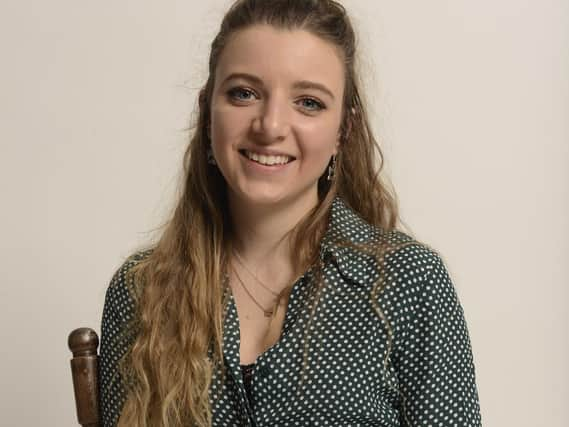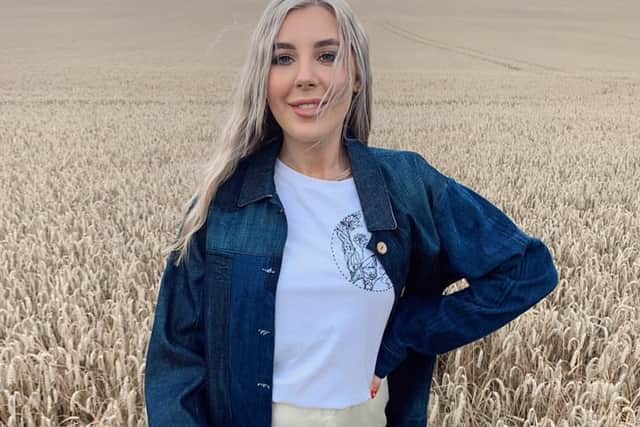Here's how buying only second-hand clothes for 30 days could help the environment


That's why a Preston fashion designer has been taking on Oxfam's charity challenge to only buy clothes second-hand for 30 days.
Eleanor Bradley, a UCLAN graduate, was inspired to do her bit for the environment after discovering that one in ten shoppers across the county do not factor in sustainability when buying new items, according to a study conducted on behalf of her fashion brand, Wild Strings. Some 60 per cent say they have to go out of their way to find out about clothing brands’ sustainability credentials – with information often hidden on a retailer’s website.
Advertisement
Hide AdAdvertisement
Hide AdEleanor said: "I think it's really hard to pick ethical clothing as a consumer as the choice can be overwhelming but if everyone shopped sustainably it would make a massive difference.


"We need to invest more in fixing our items when they break and move away from over-consumption. If you do buy new, make sure it's something you'd want to wear at least 30 times. The more you re-wear your clothes, the more you help to reduce their carbon footprint."
A person's carbon footprint is a measurement of the amount of carbon dioxide (CO2) that their activities produce. Additional CO2 in the atmosphere leads to increased greenhouse gases that trap extra heat and lead to melting ice caps and rising ocean levels, which cause flooding.
Eleanor says she was shocked to discover how much waste is produced by the clothing industry while working for fast-fashion company, Boohoo. Fast fashion refers to inexpensive clothing produced rapidly by mass-market retailers in response to the latest trends, with 13 million items being thrown away every week. After graduating from university, she vowed to do things differently and help reduce the amount of clothes that end up in landfill.
Advertisement
Hide AdAdvertisement
Hide Ad"When I was looking for a job, I didn't want to go back into that space [of fast fashion]," the designer said.
"I felt there were not enough young, small companies doing enough [to help the environment], so I decided to start my own."
The environmental enthusiast launched slow fashion brand Wild Strings approximately a year ago and uses second-hand and responsibly sourced materials.
She also says that buying items specially made for yourself is a sustainable alternative to fast fashion.
Advertisement
Hide AdAdvertisement
Hide AdShe added: "It gives you more personal connection with your clothes. A throwaway attitude has become normal so I really want to help bring back that sort of sentimentality surrounding clothes. That's the joy of buying second-hand, as the item already has its own story, and then goes on someone else's journey."
Eleanor believes that many young people feel pressured to keep up with rapidly changing trends advertised on the internet and their friends' social media feeds, leading to a throwaway attitude.
She added: "It feels like it's crept up on everyone. When you go on the internet or social media, you end up wanting something new and to always look cool and interesting. Production of clothing is so fast so there's always something new available on retailers' websites and you don't need to travel outside to buy clothes."
She hopes her brand will offer people a more sustainable way to dress by upcycling unwanted items and turning them into gorgeous new pieces. Her last collection, for example, included a dress made from old curtains in her grandad's attic.
Advertisement
Hide AdAdvertisement
Hide Ad"It's fun having to use what's already out there. Every item was a little bit different to the next," she said.
"You can have new things without having to buy fast fashion. Even if you buy from a charity shop, you can upcycle it and turn it into something new.
"I buy most of my clothes on Ebay. I love a good bidding war. I do have some fast fashion pieces in my wardrobe that I've had for years. I also use independent shops."
Eleanor also believes the pandemic is helping to change people's attitudes towards the environment, adding: "I think people are now starting to look more for the person behind the clothing, and as awful as it's been, the pandemic is making us slow down and see that we don't need a lot."
Comment Guidelines
National World encourages reader discussion on our stories. User feedback, insights and back-and-forth exchanges add a rich layer of context to reporting. Please review our Community Guidelines before commenting.